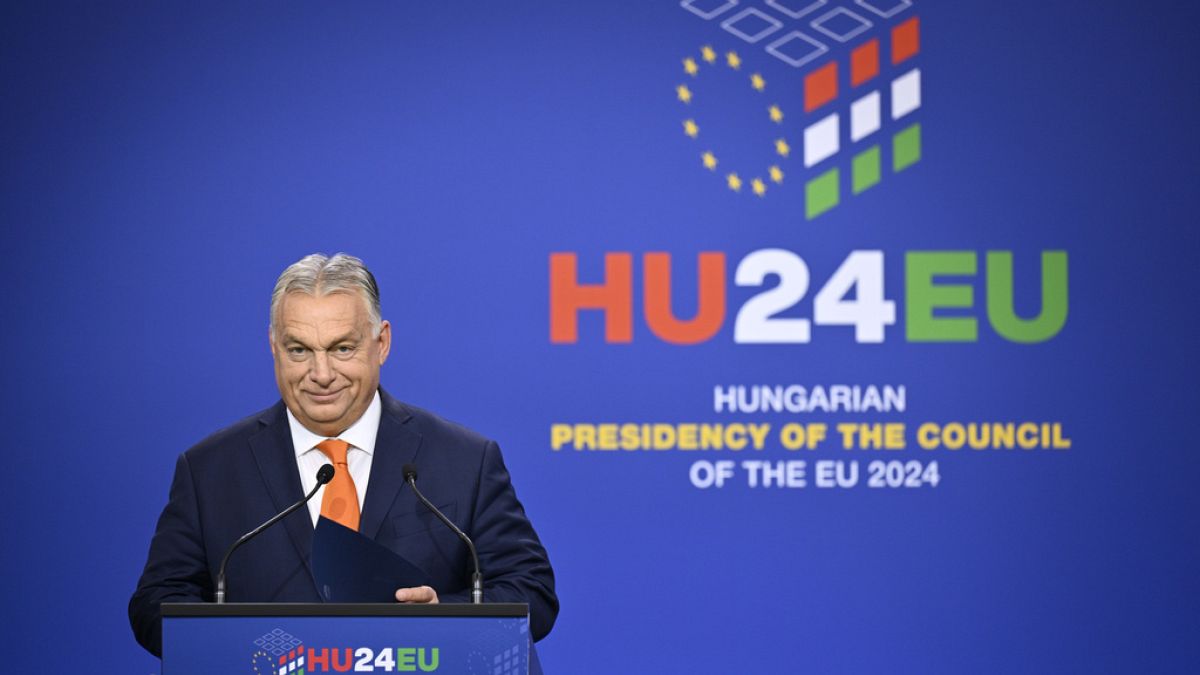Poland gears up to take-over presidency of the European Union as controversial Hungarian term comes to an end.
The presidency of the Council of the European Union rotates among the 27 member states once every six-months.
The country in presidency is tasked with guiding the council’s work and represent all member states in negotiations with other EU institutions.
Hungary led the council from 1 July through to the end of the year. On the first day of the new year, they will be succeeded by Poland.
Hungary’s term began with a controversial start, as the presidency launched with a campaign titled “Make Europe Great Again”, a slight variation of former and incoming US President Donald Trump’s infamous “Make America Great Again”, or MAGA, slogan.
But it didn’t end there, in the first week of July, also the first week of Budapest’s presidency, Hungary’s Prime Minister Viktor Orbán kicked things off with a highly criticised visit to Moscow, where he met Russian President Vladimir Putin, in what he called a “peace mission”.
Putin has been highly excluded from Europe following his invasion of Ukraine in February 2022. The Hungarian premier was the first EU leader to meet with Putin since Russia’s invasion of Ukraine. Orbán and Putin met in Moscow for the first time in early July 2022, and then again, two years later, this time, with Hungary chairing the EU.
The visits drew in widespread criticism, as the European Parliament strongly condemned the meeting in a resolution. The EU Parliament labelled the visit a “blatant violation of the EU’s treaties and common foreign policy”, and pushed for repercussions against the Hungarian leader.
Orbán also came under fire for meeting Chinese President Xi Jinping in Beijing, once again, during his country’s rotating presidency of the bloc.
Many countries in the EU started distancing from Hungary, boycotting EU meetings organised by Budapest, including the European Commission. Many leaders felt Orbán’s policies and views did not represent the rest of the bloc, nor advanced its interests or common goals.
Orbán’s constant criticisms of the EU, in both media appearances and speeches, did not help his already struggling image. The Hungarian premier has made numerous controversial remarks in interviews, criticising the bloc and individual member states.
In an interview he once criticised the European Union for its support for Ukraine, claiming that Kyiv cannot win on the battlefield, and that securing peace must come through concessions and diplomacy. He went on to further state that Budapest is looking to secure a cessation in hostilities while slamming EU leaders for ‘wanting war’.
“Those who think what we’re doing as the EU is right can go on supporting the Ukrainians. But for those who disagree, like Hungary, we won’t. This should be up to national governments,” Orbán added. While he acknowledged differences of opinion on the war with most EU member states, Orbán insisted that the majority of Europeans “want peace,” while EU leaders are in favour of continuing the conflict.
He also once in an interview accused the EU of installing a ‘puppet government’ in Warsaw to advance its interests over those of the Polish people.
Orbán has frequently clashed with Brussels, which has withheld billions in financial support from Hungary over its alleged breaches of rule-of-law and democracy standards.
Poland’s previous nationalist-conservative government also spent years wrangling with the EU over democratic deficiencies.
In response, Orbán has taken an increasingly combative approach to the bloc, which Hungary joined in 2004, and rallied Eurosceptic parties across the EU to create a far-right political force in the bloc’s legislature.
EU leaders dislike Orbán’s policies which they say have moved Hungary closer to autocracies like Russia and China.
They’re hoping the incoming Polish presidency, headed by Prime Minister Donald Tusk’s government will restore unity to the bloc, and reignite pro-European sentiment.
Checkout latest world news below links :
World News || Latest News || U.S. News
The post Hungary’s controversial presidency of the EU comes to an end appeared first on WorldNewsEra.

